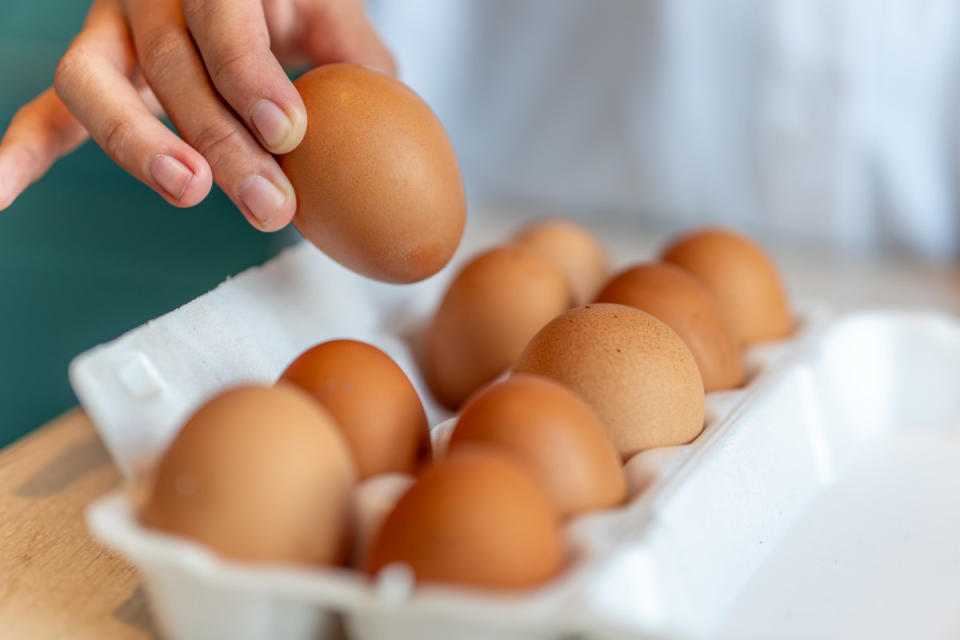Wait, Is It Safe to Eat Expired Eggs?

Carton of eggs
Now that we’ve survived the great egg shortage of 2023, prices have begun to normalize a bit and we can get back to making omelets, scrambled eggs, fried eggs and egg bites anytime we want. In my house, we run through a carton of eggs in a week, so I don’t usually have the opportunity to keep them until they expire. But from a food safety and quality perspective, it’s a good idea to know how to interpret those printed numbers on the side of egg cartons so you can know when eggs are ok to eat—and when they're not.
To understand how long you can keep crackin’ before you need to toss those eggs, we chatted with a couple of egg experts. Before you get started, though, there's a simple rule you need to follow. Britanny Saunier, executive director of the Partnership for Food Safety Education stresses “the importance of hand washing before preparing meals with eggs and after touching an egg to prevent cross-contamination.”
Now that that reminder is top of mind, let's move on to the question of the day: How long are eggs good after the expiration date?

IMAGO / Pond5 Images
Where is the expiration date on an egg carton and what do all of the numbers mean?
If you’re buying eggs from a grocery store, there are a set of numbers printed on the side of each egg carton. There’s the packing date (aka Julian date), expiration date and plant number. Yeah, that’s a lot of numbers to decipher, so let’s break down their meaning.
The packing date (or Julian date) is a three-digit numerical code that represents when the eggs were washed, graded and packaged. These numbers reflect consecutive days of the year. For instance, a Julian date of 001 corresponds to January 1, and 365 represents December 31. To help you skip the mental math, the USDA created a handy Julian date calendar so you can crack the carton code quickly.
Expiration dates may be labeled sell-by date or best-by date. The USDA doesn’t require an expiration date but some state laws do. This is a straightforward target of when to use the eggs, but it isn’t the only factor when assessing freshness.
Plant numbers (or plant code) on the egg carton start with a “P’ followed by numbers. The numbers correspond with the processing plant that washed, graded and packaged the eggs on the Julian date.
Related: How Long Do Hard-Boiled Eggs Last, Exactly?
How long do eggs last in the fridge?
If stored in the refrigerator at or below 40 degrees Fahrenheit, eggs can last for 3-5 weeks from the Julian date (aka the packing date). Liquid eggs should be consumed within 2-6 days after opening. Powdered eggs reconstituted with water can be used within four days, and they should be stored in a tightly sealed container in the refrigerator. So there’s no guessing about when I open a container, I always write the date on the package with a permanent marker.
Related: 100 of Our Best Egg Recipes for Morning, Noon and Night

IMAGO
How long can I keep eggs after the expiration date?
Ideally, you’ll want to buy eggs that haven't already expired, but eggs can safely be eaten within 3-5 weeks after the packing date. According to Rafael E. Rivera, MS, the director of food safety and production programs for the U.S. Poultry and Egg Association, “expiration dates are a mark of quality and freshness. This means that you will start seeing a deterioration of quality after these dates. Expiration dates aren’t a mark indicating the safety of the product.”
So, yes, you can still eat eggs after their expiration date if the eggs have been stored in their original container in the coldest area of your refrigerator at the right temperature and they pass the freshness tests (more on that below).
Related: The IHOP-Approved Secret Ingredient for Tender, Fluffy Omelets
Is it safe to eat an expired egg?
As stated, you’ll want to stay within the 3-5 week span for eating eggs after the packing date. Rivera notes: “It is safe if eggs are handled correctly and do not show signs of it becoming bad.”
In addition to being handled correctly, eggs also need to be cooked thoroughly to destroy bacteria.
“Egg white coagulates at 144°-149°, yolk coagulates at 149°-158° and whole eggs at 144°-158°. It's important to check temperatures by using an instant-read thermometer,” Rivera says.
Related: How Can You Keep Eggs Fresher Longer?
How can I tell if an egg is bad?
If you want to know if eggs are bad, use all your senses. If you notice a foul, spoiled smell coming from the egg carton, toss it. Also pay attention when you crack the eggs. “Eggs that aren’t fresh tend to be runny and spread out when you crack them because the membranes around the yolk and the white aren’t as intact,” says Rivera.
Rivera adds: “Fresh eggs don’t have a rotten smell or appear cloudy or runny. These are signs of eggs that are old or spoiled and can’t be consumed. Fresh eggs have a firm egg yolk, and the egg white is also firm as well even if just a little bit runs out.”
And there’s always the float test. Place the egg in a bowl of water. If it’s fresh, it will sink. Older eggs may stand upright or float due to a larger air cell inside the shell.
Related: Here’s What Happens to Your Body if You Eat Eggs Every Day
Good egg tips to know
We’ve covered a lot of key information, but if you need a few quick tips and tricks going forward, keep this list handy:
Store eggs immediately and place them in the coldest section of the refrigerator—not in or near the door—to avoid temperature fluctuations.
Storing eggs in a closed carton can protect them from cracks and also from absorbing odors from other food.
If you break an egg in the carton, transfer it to a clean airtight container and refrigerate for up to two days.
Always refrigerate liquid eggs and use within 2-6 days of purchase.
While fresh eggs in the shell shouldn’t be frozen, egg yolks and egg whites can be beaten together and frozen in a tightly sealed container for up to one year.
Eggs don’t need to be washed because they were sanitized before packing.
Two hours is the cutoff for eggs to be left out at room temperature because bacteria growth can begin.
SOURCES:
Rafael E. Rivera, MS, Director, Food Safety & Production Programs, U.S. Poultry & Egg Association
Executive Director, Britanny Saunier, Partnership for Food Safety Education
Up next: Beyond California Rolls: Everything You Need to Know About Imitation Crab

